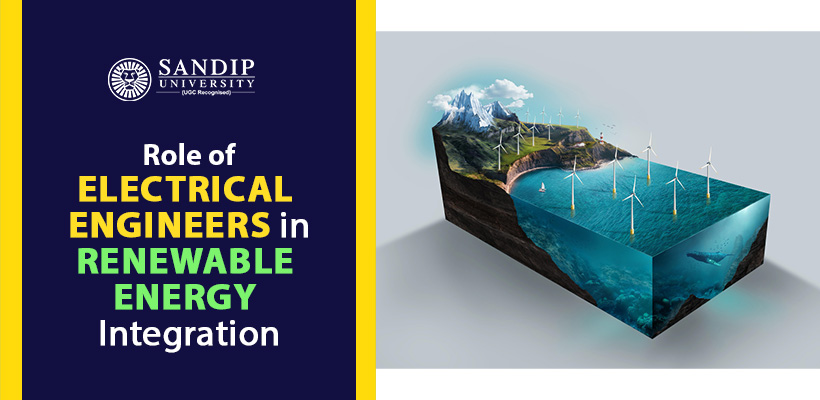Electrical engineers are the future of sustainable development and renewable energy. They have a unique position in the industry where they can influence massive change in future technologies. Many electrical engineering courses after 12th are designed to train professionals in this field and facilitate the integration of renewable energy in different industries. There is a need for drastic measures to be undertaken today to safeguard the environment for future generations. Electrical engineers are bound to play an even more significant role through renewable energy in deciding the safety of our planet.
Let us take a deep dive into the role of electrical engineers in renewable energy, issues faced by these professionals, various untapped sources of renewable energy, qualifications and skills needed to cut it in this field, and career options after graduation.
What is the Role of Electrical Engineers in the Future of Renewable Energy?
Electrical engineers can play a significant role in utilising and conserving renewable energy by designing and employing effective energy systems. These professionals are tasked with the optimisation, generation, distribution, and usage of electricity in various capacities. The future of electrical engineering is the implementation of smart grids and other technologies that can optimise the use of renewable energy without wastage.
Besides this, there is a need for technologies to generate and save renewable energy for later use. For example, we currently have batteries used in mobiles, laptops, and other electronic items which generally rely on non-renewable energy sources. The need of the hour is for electrical engineers to design and develop sustainable and practical energy storage solutions which can be relied upon even when the sun may not be brightly shining, and the wind may not be favourably blowing.
Current Issues Faced by Electrical Engineers When Integrating Renewable Energy
Despite there being many theoretical possibilities of integrating renewable energy in mainstream usage of electricity, there are many challenges that need to be addressed. These are some of the most pressing challenges that electrical engineers need to work on to enable the integration of renewable energy efficiently:
- Closing the gap and creating a practical balance between tech development and environmental sustainability
- Minimise wastage of power by creating better and more efficient power storage and distribution systems
- Innovation in electronics to make them more eco-friendly to minimise wastage of energy
- Bring about a wave of sustainability energy production and usage in all spheres of electrical engineering going forward
Top Renewable Energy Sources Electrical Engineers can Tap
There are many natural and renewable energy sources that electrical engineers can tap to create a sustainable future, including:
- Solar Power
For a nation like India, tapping solar power is the most obvious solution towards renewable energy integration. Electrical engineers need to design and engage solar photovoltaic tech that can be installed on commercial and residential rooftops to capture, store, and use solar power.
- Wind Power
Wind power is another vital and renewable source of energy that can be tapped into. Electrical engineers need to design and implement sustainable wind turbines that can capture wind energy and convert it into usable electricity. Wind farms with efficient and high-tech wind turbines are the long-term solution.
- Hydroelectric Power
Hydroelectric power can be harnessed in areas where water flow can generate energy. Hydropower systems need to be designed by electrical engineers to harness hydropower. Structures like dams, turbines, and hydropower generators can create clean electricity through the flow of water.
- Smart Grids
Smart grids are the main focus of many electrical engineers as this technology can truly revolutionise the integration of renewable energy. Smart grids are used to ensure the efficient distribution and usage of renewable energy. These grids can be monitored in real-time to ensure improved energy efficiency.
- Renewable Energy Storage
Electrical engineers need to work on renewable energy storage systems. These systems are made to ensure that excess energy can be generated and stored during topmost energy production periods, and can be utilised as and when the demand arises.
- Electrical Engineering in the IT Sector
Electrical engineers are also employed in the IT sector to create cutting-edge technology like Internet of Things (IoT), telecommunications like high-speed internet and 5G tech, artificial intelligence, machine learning, electrical vehicles, and much more to ensure sustainable use of renewable energy.
Qualifications and Skills Needed to be a Successful Electrical Engineer
Electrical engineers qualified with one of the best electronics engineering courses in Maharashtra can have a successful career in this field. Courses like B.Tech in Electrical Engineering can amp up your knowledge and skills in this field to help you gain the right career opportunities.
These are some of the skills needed to cut it as an electrical engineer:
- Knowledge about circuit designing
- Analytical thinking and problem-solving
- Technical knowledge about electrical equipment
- Collection of relevant data and its analysis
- Computer-aided design know-how
- Efficient communication and leadership skills
- Knowledge about mathematics, statistics, and computers
- Project management and creative thinking
- Basic programming skills
- Knowledge about linear systems and its analysis
Emerging Career Opportunities in Renewable Energy for an Electrical Engineering Profile
There are many career opportunities in electrical engineering with regards to renewable energy. Some of the top opportunities in electrical engineering are:
- Electrical Engineer
- Telecommunications Engineer
- Electrical Design Engineer
- Grid Integration and Stability Engineer
- Solar Design Engineer
- Electrical Surveyor
- Solar Project Engineer
- Renewable Energy Maintenance Engineer
- Power Systems Engineer
- Project Engineer
- Systems Engineer
- Substation Engineer
- Substation Design Engineer
- Instrumentation Engineer
- Battery Energy Storage (BESS) Manager
Conclusion
These are some of the ways in which electrical engineers can effectively integrate renewable energy into our day-to-day lives. There are many top electrical engineering colleges in Nashik that offer competitive and globally-recognised qualifications in this field. This is a very promising industry, and you can definitely make a positive impact with the right knowledge and skills. Good luck!

